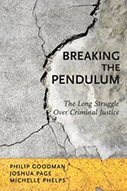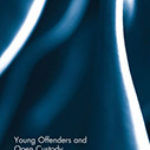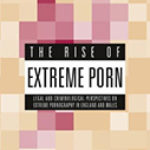Breaking The Pendulum: The Long Struggle Over Criminal Justice

Authors: Philip Goodman, Joshua Page, and Michelle Phelps
Publisher: Oxford, UK: Oxford University Press, 2017. 240p.
Reviewer: Ashley Appleby | March 2018
Breaking the Pendulum: The Long Struggle Over Criminal Justice helps the reader understand the issues facing punishment and criminal justice through an alternative lens — one that dismisses the well-known pendulum metaphor as misleading. Instead of a pendulum, the authors describe punishment as a system that is impacted by real struggles of many different actors rather than by the sole swinging back and forth of a pendulum. Philip Goodman, Joshua Page, and Michelle Phelps clearly defend their thesis by presenting the reader with three central axioms at the core of their antagonistic framework.
The first axiom addresses the struggle for power and how that power is divided amongst powerful actors. As the authors emphasize, there are many different actions that lead to penal change, made visible through the negotiations amongst actors such as criminologists, politicians, and economists. These actors have an active role in influencing how change happens, and who it impacts, through conflicting opinions and objectives, which brings us to the second axiom.
The second axiom addresses the consistency of punishment by asserting that it will always be present. There is, however, constant struggle and disagreement over how to punish and who to punish based on the social construction of different groups and who has the power to influence those groups. Consistency of punishment throughout place is absent, thus jurisdictional power plays a large role in this as well.
The third and final axiom addresses the large-scale trends that impact punishment. The authors highlight the different social contexts that lend a hand in shaping the social world, suggesting that punishment is reliant not only on social factors but also on the circumstances surrounding those social factors.
Throughout Breaking the Pendulum: The Long Struggle Over Criminal Justice, Goodman, Page, and Phelps expand on the evolution of penal change as a product of struggle in the social world overtime. Although the authors do a great job in defining struggle as beneficial, a useful addition to the book may include an acknowledgement of those who have experienced struggle on the receiving end of the criminal justice system through an expansion on how struggle shapes perceptions and reactions to the policies in place. Overall, this book is a great read for all criminal justice and social science scholars, as it provides a new outlook on the long history of criminal justice actors and processes.
Ashley Appleby, Ph.D. Student, Rutgers School of Criminal Justice, Rutgers University, Newark


